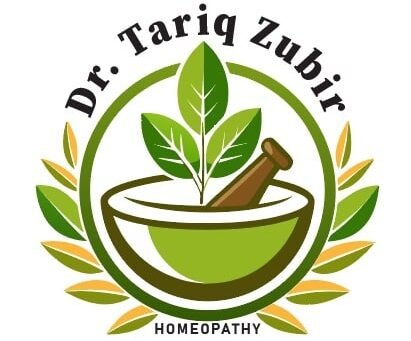By Dr. Tariq Zubair
Illnesses That Homeopathy Can Help In recent years, more people are exploring natural and holistic ways to manage their health — and for good reason. Homeopathy, a gentle and individualized form of medicine, has helped millions around the world deal with chronic and recurring conditions without the side effects of conventional drugs.
As a practicing homeopathic physician, I’ve seen firsthand how effective this system can be. Here are five common health issues that typically respond very well to homeopathic treatment.

1. Allergies — Seasonal, Dust, and Food-Related
Whether it’s sneezing during pollen season, a reaction to dust, or an intolerance to certain foods, allergies can interfere with daily life. Homeopathy doesn’t just mask the symptoms like antihistamines do — it aims to correct the body’s overreaction.
Common remedies include:
Allium cepa (for runny nose and watery eyes),
Natrum muriaticum (for sneezing and sinus pressure),
Arsenicum album (for burning nasal discharge and restlessness).
Clinical Insight: One of my patients, a 26-year-old teacher with a long history of hay fever, experienced significant symptom relief within two weeks of starting treatment — without any antihistamines.
2. Migraines and Frequent Headaches
Illnesses That Homeopathy Can Help : Migraine sufferers often feel trapped by medications that offer only short-term relief. Homeopathy looks beyond the pain to identify and treat the underlying triggers — whether stress, digestive disturbances, or hormonal changes.
Helpful remedies include:
Belladonna, Iris versicolor, and Sanguinaria canadensis — selected based on the exact pattern of pain, timing, and emotional state.
Why it works: Homeopathy personalizes the treatment. No two migraine patients are treated the same — and that’s what makes the difference.
3. Skin Issues — Eczema, Acne, and Psoriasis
Illnesses That Homeopathy Can Help :: Skin problems can take a toll on both physical comfort and confidence. Homeopathy takes a deep approach — aiming to correct the internal imbalance that often shows up on the skin.
Commonly used remedies:
Sulphur (for itchy, inflamed skin),
Graphites (for dry, cracked skin),
Hepar sulph (for painful, infected acne).
Case Note: A teenage boy with severe acne saw a remarkable improvement in just three months, regaining not just clear skin, but also self-esteem.
4. Digestive Disorders like IBS
Illnesses That Homeopathy Can Help :: Irritable Bowel Syndrome (IBS) is frustrating — with symptoms that can range from bloating and gas to irregular bowel habits. While conventional medicine may offer short-term fixes, homeopathy focuses on long-term regulation.
Effective remedies include:
Nux vomica (for indigestion and irritability),
Lycopodium (for gas and bloating),
Colocynthis (for cramping relieved by pressure).
What patients report: Along with digestive relief, many feel emotionally balanced and less anxious — a true holistic benefit.
5. Anxiety and Sleep Problems
Stress, anxiety, and poor sleep have become increasingly common. Homeopathy offers gentle support that calms the mind and nervous system without causing dependence or sedation.
Helpful remedies include:
Ignatia (for emotional grief or heartbreak),
Aconite (for panic and sudden fear),
Kali phosphoricum (for stress-related exhaustion).
Real-life success: Many of my patients struggling with insomnia or panic episodes found a lasting sense of calm through constitutional homeopathy, rather than relying on sleeping pills or antidepressants.
Frequently Asked Questions (FAQ)
Q1: Is homeopathy safe to use alongside conventional medicine?
A: Yes, homeopathy is generally safe and non-interactive with most conventional treatments. However, always consult both your homeopathic and allopathic doctors before combining treatments.
Q2: How long does it take to see results with homeopathy?
A: It depends on the condition and the individual. Acute conditions may improve within days, while chronic illnesses may take weeks or months to respond fully.
Q3: Is homeopathy just placebo?
A: While critics argue about the mechanisms, the clinical results and patient testimonials suggest otherwise. Homeopathy focuses on individual symptom patterns, which makes it more than a “one-size-fits-all” approach.
Q4: Are homeopathic remedies safe for children and elderly patients?
A: Absolutely. Because they’re non-toxic and given in minute doses, homeopathic remedies are particularly well-suited for sensitive individuals, including infants and the elderly.
Q5: How do I get started with homeopathic treatment?
A: It’s best to consult a qualified homeopathic practitioner who can take a detailed case history and prescribe a personalized remedy based on your symptoms, temperament, and overall health profile.
Final Thoughts from Dr. Tariq Zubair
Homeopathy is more than just treating disease — it’s about restoring balance and supporting the body’s natural ability to heal. While it’s not a substitute for emergency care or necessary surgeries, it offers a powerful tool for managing chronic and functional disorders — naturally and safely.
If you’re curious about how homeopathy could help you or a loved one, consider scheduling a consultation. Sometimes, the most gentle path can be the most powerful one.
